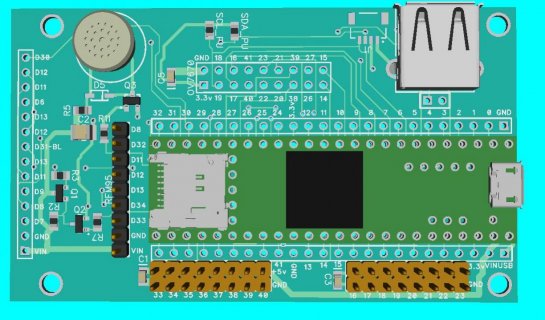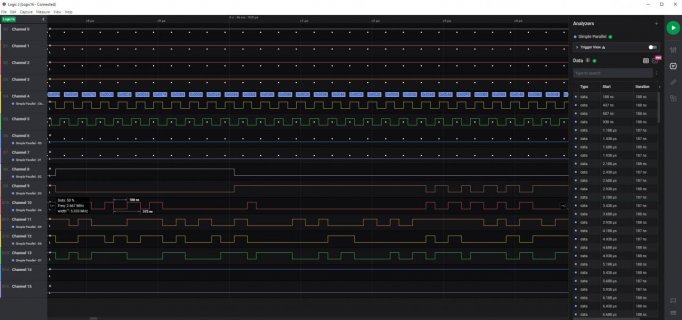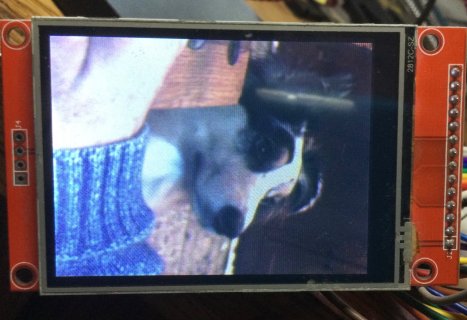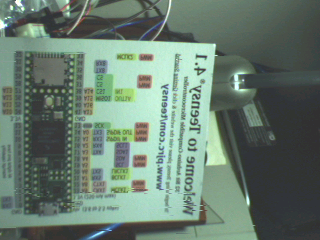KurtE
Senior Member+
Right now it looks like my Wire(I2) connection is actually not working to that one... So may need to rework... Scanner is not finding it. 
The read from other software on other camera
Now to fix wiring. Not sure if I will remove from my board and like other one use breadboard... Or try to attach PRs to board...
The read from other software on other camera
Code:
I2C Read: reg: 0x00(GAIN), value = 0x7F
I2C Read: reg: 0x01(BLUE), value = 0xF0
I2C Read: reg: 0x02(RED), value = 0x40
I2C Read: reg: 0x03(VREF), value = 0xA
I2C Read: reg: 0x04(COM1), value = 0x0
I2C Read: reg: 0x05(BAVE), value = 0x2F
I2C Read: reg: 0x06(GbAVE), value = 0x40
I2C Read: reg: 0x07(AECHH), value = 0x40
I2C Read: reg: 0x08(RAVE), value = 0x36
I2C Read: reg: 0x09(COM2), value = 0x1
I2C Read: reg: 0x0a(PID), value = 0x76
I2C Read: reg: 0x0b(VER), value = 0x73
I2C Read: reg: 0x0c(COM3), value = 0x0
I2C Read: reg: 0x0d(COM4), value = 0x40
I2C Read: reg: 0x0e(COM5), value = 0x61
I2C Read: reg: 0x0f(COM6), value = 0x4B
I2C Read: reg: 0x10(AECH), value = 0x72
I2C Read: reg: 0x11(CLKRC), value = 0x3
I2C Read: reg: 0x12(COM7), value = 0x4
I2C Read: reg: 0x13(COM8), value = 0xE7
I2C Read: reg: 0x14(COM9), value = 0x38
I2C Read: reg: 0x15(COM10), value = 0x20
I2C Read: reg: 0x16(*RSVD*), value = 0x2
I2C Read: reg: 0x17(HSTART), value = 0x13
I2C Read: reg: 0x18(HSTOP), value = 0x1
I2C Read: reg: 0x19(VSTART), value = 0x2
I2C Read: reg: 0x1a(VSTOP), value = 0x7A
I2C Read: reg: 0x1b(PSHFT), value = 0x0
I2C Read: reg: 0x1c(MIDH), value = 0x7F
I2C Read: reg: 0x1d(MIDL), value = 0xA2
I2C Read: reg: 0x1e(MVFP), value = 0x7
I2C Read: reg: 0x1f(LAEC), value = 0x0
I2C Read: reg: 0x20(ADCCTR0), value = 0x4
I2C Read: reg: 0x21(ADCCTR1), value = 0x2
I2C Read: reg: 0x22(ADCCTR2), value = 0x91
I2C Read: reg: 0x23(ADCCTR3), value = 0x0
I2C Read: reg: 0x24(AEW), value = 0x95
I2C Read: reg: 0x25(AEB), value = 0x33
I2C Read: reg: 0x26(VPT), value = 0xE3
I2C Read: reg: 0x27(BBIAS), value = 0x80
I2C Read: reg: 0x28(GbBIAS), value = 0x80
I2C Read: reg: 0x29(*RSVD*), value = 0x7
I2C Read: reg: 0x2a(EXHCH), value = 0x0
I2C Read: reg: 0x2b(EXHCL), value = 0x0
I2C Read: reg: 0x2c(RBIAS), value = 0x80
I2C Read: reg: 0x2d(ADVFL), value = 0x0
I2C Read: reg: 0x2e(ADVFH), value = 0x0
I2C Read: reg: 0x2f(YAVE), value = 0x16
I2C Read: reg: 0x30(HSYST), value = 0x8
I2C Read: reg: 0x31(HSYEN), value = 0x30
I2C Read: reg: 0x32(HREF), value = 0xB6
I2C Read: reg: 0x33(CHLF), value = 0xB
I2C Read: reg: 0x34(ARBLM), value = 0x11
I2C Read: reg: 0x35(*RSVD*), value = 0xB
I2C Read: reg: 0x36(*RSVD*), value = 0x0
I2C Read: reg: 0x37(ADC), value = 0x1D
I2C Read: reg: 0x38(ACOM), value = 0x71
I2C Read: reg: 0x39(OFON), value = 0x2A
I2C Read: reg: 0x3a(TSLB), value = 0x4
I2C Read: reg: 0x3b(COM11), value = 0x12
I2C Read: reg: 0x3c(COM12), value = 0x78
I2C Read: reg: 0x3d(COM13), value = 0xC0
I2C Read: reg: 0x3e(COM14), value = 0x0
I2C Read: reg: 0x3f(EDGE), value = 0x1
I2C Read: reg: 0x40(COM15), value = 0x10
I2C Read: reg: 0x41(COM16), value = 0x38
I2C Read: reg: 0x42(COM17), value = 0x0
I2C Read: reg: 0x43(AWBC1), value = 0xA
I2C Read: reg: 0x44(AWBC2), value = 0xF0
I2C Read: reg: 0x45(AWBC3), value = 0x34
I2C Read: reg: 0x46(AWBC4), value = 0x58
I2C Read: reg: 0x47(AWBC5), value = 0x28
I2C Read: reg: 0x48(AWBC6), value = 0x3A
I2C Read: reg: 0x49(*RSVD*), value = 0x0
I2C Read: reg: 0x4a(*RSVD*), value = 0x0
I2C Read: reg: 0x4b(REG4B), value = 0x9
I2C Read: reg: 0x4c(DNSTH), value = 0x20
I2C Read: reg: 0x4d(DM_POS), value = 0x40
I2C Read: reg: 0x4e(*RSVD*), value = 0x20
I2C Read: reg: 0x4f(MTX1), value = 0xB3
I2C Read: reg: 0x50(MTX2), value = 0xB3
I2C Read: reg: 0x51(MTX3), value = 0x0
I2C Read: reg: 0x52(MTX4), value = 0x3D
I2C Read: reg: 0x53(MTX5), value = 0xA7
I2C Read: reg: 0x54(MTX6), value = 0xE4
I2C Read: reg: 0x55(BRIGHT), value = 0x0
I2C Read: reg: 0x56(CONTRAS), value = 0x40
I2C Read: reg: 0x57(CONTRAS_CENTER), value = 0x80
I2C Read: reg: 0x58(MTXS), value = 0x9E
I2C Read: reg: 0x59(AWBC7), value = 0x88
I2C Read: reg: 0x5a(AWBC8), value = 0x88
I2C Read: reg: 0x5b(AWBC9), value = 0x44
I2C Read: reg: 0x5c(AWBC10), value = 0x67
I2C Read: reg: 0x5d(AWBC11), value = 0x49
I2C Read: reg: 0x5e(AWBC12), value = 0xE
I2C Read: reg: 0x5f(B_LMT), value = 0xF0
I2C Read: reg: 0x60(R_LMT), value = 0xF0
I2C Read: reg: 0x61(G_LMT), value = 0xF0
I2C Read: reg: 0x62(LCC1), value = 0x0
I2C Read: reg: 0x63(LCC2), value = 0x0
I2C Read: reg: 0x64(LCC3), value = 0x50
I2C Read: reg: 0x65(LCC4), value = 0x30
I2C Read: reg: 0x66(LCC5), value = 0x0
I2C Read: reg: 0x67(MANU), value = 0x80
I2C Read: reg: 0x68(MANV), value = 0x80
I2C Read: reg: 0x69(GFIX), value = 0x0
I2C Read: reg: 0x6a(GGAIN), value = 0x6C
I2C Read: reg: 0x6b(DBLV), value = 0x4A
I2C Read: reg: 0x6c(AWBCTR3), value = 0xA
I2C Read: reg: 0x6d(AWBCTR2), value = 0x55
I2C Read: reg: 0x6e(AWBCTR1), value = 0x11
I2C Read: reg: 0x6f(AWBCTR0), value = 0x9F
I2C Read: reg: 0x70(SCALING_XSC), value = 0x3A
I2C Read: reg: 0x71(SCALING_YSC), value = 0x35
I2C Read: reg: 0x72(SCALING_DCWCTR), value = 0x11
I2C Read: reg: 0x73(SCALING_PCLK_DIV), value = 0xF0
I2C Read: reg: 0x74(REG74), value = 0x10
I2C Read: reg: 0x75(REG75), value = 0x5
I2C Read: reg: 0x76(REG76), value = 0xE1
I2C Read: reg: 0x77(REG77), value = 0x1
I2C Read: reg: 0x78(*RSVD*), value = 0x4
I2C Read: reg: 0x79(*RSVD*), value = 0x26
I2C Read: reg: 0x7a(SLOP), value = 0x20
I2C Read: reg: 0x7b(GAMA1), value = 0x10
I2C Read: reg: 0x7c(GAMA2), value = 0x1E
I2C Read: reg: 0x7d(GAMA3), value = 0x35
I2C Read: reg: 0x7e(GAMA4), value = 0x5A
I2C Read: reg: 0x7f(GAMA5), value = 0x69
I2C Read: reg: 0x80(GAMA6), value = 0x76
I2C Read: reg: 0x81(GAMA7), value = 0x80
I2C Read: reg: 0x82(GAMA8), value = 0x88
I2C Read: reg: 0x83(GAMA9), value = 0x8F
I2C Read: reg: 0x84(GAMA10), value = 0x96
I2C Read: reg: 0x85(GAMA11), value = 0xA3
I2C Read: reg: 0x86(GAMA12), value = 0xAF
I2C Read: reg: 0x87(GAMA13), value = 0xC4
I2C Read: reg: 0x88(GAMA14), value = 0xD7
I2C Read: reg: 0x89(GAMA15), value = 0xE8
I2C Read: reg: 0x8a(*RSVD*), value = 0x0
I2C Read: reg: 0x8b(*RSVD*), value = 0x0
I2C Read: reg: 0x8c(?RGB444), value = 0x0
I2C Read: reg: 0x8d(*RSVD*), value = 0x4F
I2C Read: reg: 0x8e(*RSVD*), value = 0x0
I2C Read: reg: 0x8f(*RSVD*), value = 0x0
I2C Read: reg: 0x90(*RSVD*), value = 0x0
I2C Read: reg: 0x91(*RSVD*), value = 0x0
I2C Read: reg: 0x92(DM_LNL), value = 0x0
I2C Read: reg: 0x93(DM_LNH), value = 0x0
I2C Read: reg: 0x94(LCC6), value = 0x50
I2C Read: reg: 0x95(LCC7), value = 0x50
I2C Read: reg: 0x96(*RSVD*), value = 0x0
I2C Read: reg: 0x97(*RSVD*), value = 0x30
I2C Read: reg: 0x98(*RSVD*), value = 0x20
I2C Read: reg: 0x99(*RSVD*), value = 0x30
I2C Read: reg: 0x9a(*RSVD*), value = 0x84
I2C Read: reg: 0x9b(*RSVD*), value = 0x29
I2C Read: reg: 0x9c(*RSVD*), value = 0x3
I2C Read: reg: 0x9d(BD50ST), value = 0x4C
I2C Read: reg: 0x9e(BD60ST), value = 0x3F
I2C Read: reg: 0x9f(HAECC1), value = 0x78
I2C Read: reg: 0xa0(HAECC2), value = 0x68
I2C Read: reg: 0xa1(DSPC3), value = 0x3
I2C Read: reg: 0xa2(SCALING_PCLK_DELAY), value = 0x2
I2C Read: reg: 0xa3(*RSVD*), value = 0x4
I2C Read: reg: 0xa4(NT_CTRL), value = 0x88
I2C Read: reg: 0xa5(AECGMAX), value = 0x5
I2C Read: reg: 0xa6(LPH), value = 0xD8
I2C Read: reg: 0xa7(UPL), value = 0xD8
I2C Read: reg: 0xa8(TPL), value = 0xF0
I2C Read: reg: 0xa9(TPH), value = 0x90
I2C Read: reg: 0xaa(NALG), value = 0x94
I2C Read: reg: 0xab(*RSVD*), value = 0x7
I2C Read: reg: 0xac(STR-OPT), value = 0x0
I2C Read: reg: 0xad(STR_R), value = 0x80
I2C Read: reg: 0xae(STR_G), value = 0x80
I2C Read: reg: 0xaf(STR_B), value = 0x80
I2C Read: reg: 0xb0(*RSVD*), value = 0x84
I2C Read: reg: 0xb1(ABLC1), value = 0xC
I2C Read: reg: 0xb2(*RSVD*), value = 0xE
I2C Read: reg: 0xb3(THL_ST), value = 0x82
I2C Read: reg: 0xb4(*RSVD*), value = 0x0
I2C Read: reg: 0xb5(THL_DLT), value = 0x4
I2C Read: reg: 0xb6(*RSVD*), value = 0x0
I2C Read: reg: 0xb7(*RSVD*), value = 0x66
I2C Read: reg: 0xb8(*RSVD*), value = 0xA
I2C Read: reg: 0xb9(*RSVD*), value = 0x6
I2C Read: reg: 0xba(*RSVD*), value = 0x0
I2C Read: reg: 0xbb(*RSVD*), value = 0x0
I2C Read: reg: 0xbc(*RSVD*), value = 0x0
I2C Read: reg: 0xbd(*RSVD*), value = 0x0
I2C Read: reg: 0xbe(AD-CHB), value = 0x45
I2C Read: reg: 0xbf(AD-CHR), value = 0x45
I2C Read: reg: 0xc0(AD-CHGb), value = 0x4E
I2C Read: reg: 0xc1(AD-CHRr), value = 0x4B
I2C Read: reg: 0xc2(*RSVD*), value = 0x0
I2C Read: reg: 0xc3(*RSVD*), value = 0x0
I2C Read: reg: 0xc4(*RSVD*), value = 0x0
I2C Read: reg: 0xc5(*RSVD*), value = 0x0
I2C Read: reg: 0xc6(*RSVD*), value = 0x0
I2C Read: reg: 0xc7(*RSVD*), value = 0x0
I2C Read: reg: 0xc8(*RSVD*), value = 0xA1
I2C Read: reg: 0xc9(SATCTR), value = 0x69Now to fix wiring. Not sure if I will remove from my board and like other one use breadboard... Or try to attach PRs to board...





